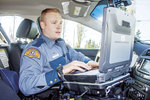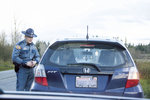If there’s one skill that’s essential to J.T. Hodgson as a trooper with the Washington State Patrol, it’s the ability to operate independently.
In East Jefferson County, Hodgson copes not …
This item is available in full to subscribers.
We have recently launched a new and improved website. To continue reading, you will need to either log into your subscriber account, or purchase a new subscription.
If you had an active account on our previous website, then you have an account here. Simply reset your password to regain access to your account.
If you did not have an account on our previous website, but are a current print subscriber, click here to set up your website account.
Otherwise, click here to view your options for subscribing.
* Having trouble? Call our circulation department at 360-385-2900, or email our support.
Please log in to continue |
|


If there’s one skill that’s essential to J.T. Hodgson as a trooper with the Washington State Patrol, it’s the ability to operate independently.
In East Jefferson County, Hodgson copes not only with the limited staffing that’s common to many agencies in the area, but also with the challenging topography of the area itself.
“You can drive 20 miles and the landscape will look nothing like where you started, with probably five to 10 hills in between,” said Hodgson, who noted that the advances in radio communication that have benefited law enforcement in flatter regions are ill-suited to the signal-jamming mountains and valleys of his patrol zone, roughly 40 miles along U.S. Highway 101.
On most nights, Hodgson works his 10-hour shift alone, covering East Jefferson County, while another trooper covers Clallam County, and a third patrols the town of Forks.
“If our guy on the west side needs additional units, then we go to Forks,” said Hodgson, who recently took two trips in one week to the other side of the peninsula to respond (in separate instances) to a kidnapping and a barricaded suspect.
SELF-RELIANCE
But most of the time, Hodgson makes his way from Port Townsend, Port Hadlock and Chimacum to Quilcene and Brinnon on his own.
His headquarters is in Port Angeles, and he estimates he sees his sergeant once a week.
Even ride-along requests, such as when The Leader accompanied him for this story, are relatively rare, since most state patrol applicants in the area go to Bremerton.
In the first hour of a Friday-night shift recently, Hodgson pulled over five drivers and gave all of them warnings.
“I always wanted to go into public service, and I like working with people, so this felt like a good fit,” said Hodgson, who has worked with state patrol for three years. “Most folks who ride along with me are surprised by the freedom we have. This job depends on self-reliance. It’s important that you don’t need a babysitter.”
During the early evening hours, most of Hodgson’s contacts are made with speeders who are unfamiliar with the area, and his approach favors education more than punishment.
“I don’t like to give tickets for speeding,” Hodgson said. “I swore an oath to use the minimum amount of force necessary. If I can use a conversation instead, to get people to adopt safer habits, all the better.”
On slower nights, Hodgson is able to assist other law enforcement agencies, such as the Port Townsend Police Department and the Jefferson County Sheriff’s Office, in duties ranging from serving warrants to participating in “emphasis patrols,” patrols that emphasize, for example, not drinking while driving or not texting while driving.
But while some nights have involved apprehending animal poachers and drug traffickers, others have seen him so busy responding to calls that he literally doesn’t have a moment to catch his breath.
“Winter brings more inclement weather, and with it, more traffic accidents due to slick roads,” Hodgson said. “But summer brings more traffic accidents due to more vehicles, and more drivers who are, again, unfamiliar with the roads.”
LIFE AFFIRMING
While Hodgson has “little tolerance” for habitually unsafe drivers, having seen the results of car crashes, especially those involving small children, he also recognizes that drivers can make errors without realizing it, such as drifting onto the shoulder of the road.
“Cyclists can get killed when that happens,” Hodgson said.
One of the most harrowing yet life-affirming calls that Hodgson responded to was when Capt. Mike Stringer of the county sheriff’s office was injured responding to a vehicular accident just outside of Port Townsend April 2.
“I think I was like the third officer on the scene,” Hodgson said. “It doesn’t matter what badge you wear, because everyone is a first responder in a situation like that. If one of your brothers or sisters goes down, you drop what you’re doing to render aid and assistance. That spirit of camaraderie is why I want to work with these people, even though I hope I never hear a call like that again.”
That belief in interagency teamwork is what drives Hodgson to maintain awareness of where patrol officers from the Port Townsend Police Department and the Jefferson County Sheriff’s Office are cruising during his own shifts, in case they require assistance. That knowledge also could be advantageous if he needs help before his backup from Clallam or Forks can arrive.
“There’s a lot of decent folks in these communities,” Hodgson said. “Most of them would give you the shirts of their backs. But it can get interesting on Wednesday, Thursday and Sunday nights. You’d think Friday nights would be busier, but sometimes it’s just crickets. A lot of times, it’s when you would think that nothing’s happening.”
BEFORE DARK
Hodgson tries to pull over vehicles with faulty lights as early in the evening as he can, so they can get fixed before dark, and he pays closer attention to cars and trucks that have been more heavily modified, just in case they include stolen parts.
“If I see a different-colored panel, I’ll check the VINs [vehicle identification numbers],” Hodgson said, even as he finished giving a verbal warning to a driver whose car had a faulty brake light and a modified exhaust.
“Yeah, I’d seen that car before, but I hadn’t spoken with the driver. He was super nice. I grew up here, and it’s not a very big community, so most of the other people who live here, I’ve spoken to them at least once.”
Hodgson has apprehended street racers, burning rubber in literally million-dollar custom vehicles.
He acknowledged that the region’s hot-rod culture dates back at least to the teen years of the baby boomers who grew up in the area.
“We find them about half the time,” Hodgson said. “So much of this job is about just using our presence to help keep people safe, by acting as a deterrent. I try to bounce around and keep it random. One time, I just happened to be passing by when a woman ran out of her house in a panic, because her husband had lost consciousness. Being present when people need you matters.”